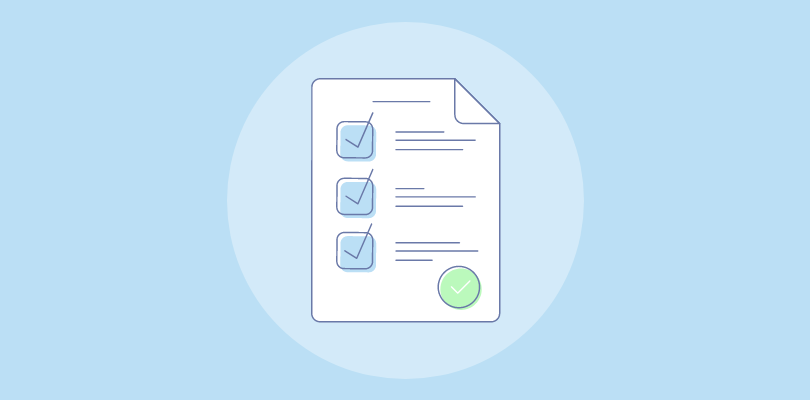Recruiting can be a nail-biting experience, with the wrong hire potentially costing companies a fortune. Can you avoid this fate? Absolutely! Cognitive assessment tests can help recruiters find a needle in a haystack and ensure that candidates possess the necessary skills to succeed.
Gone are the days of guesswork and gut-feeling hiring decisions. With cognitive ability tests for employment, recruiters can level up their recruitment game and make data-driven choices. After all, why settle for less when you can have the best?
If you’re a recruiter looking to bring top talent on board, it’s time to take the guesswork out of the recruitment process.
Let’s jump in!
What Is a Cognitive Assessment Test?
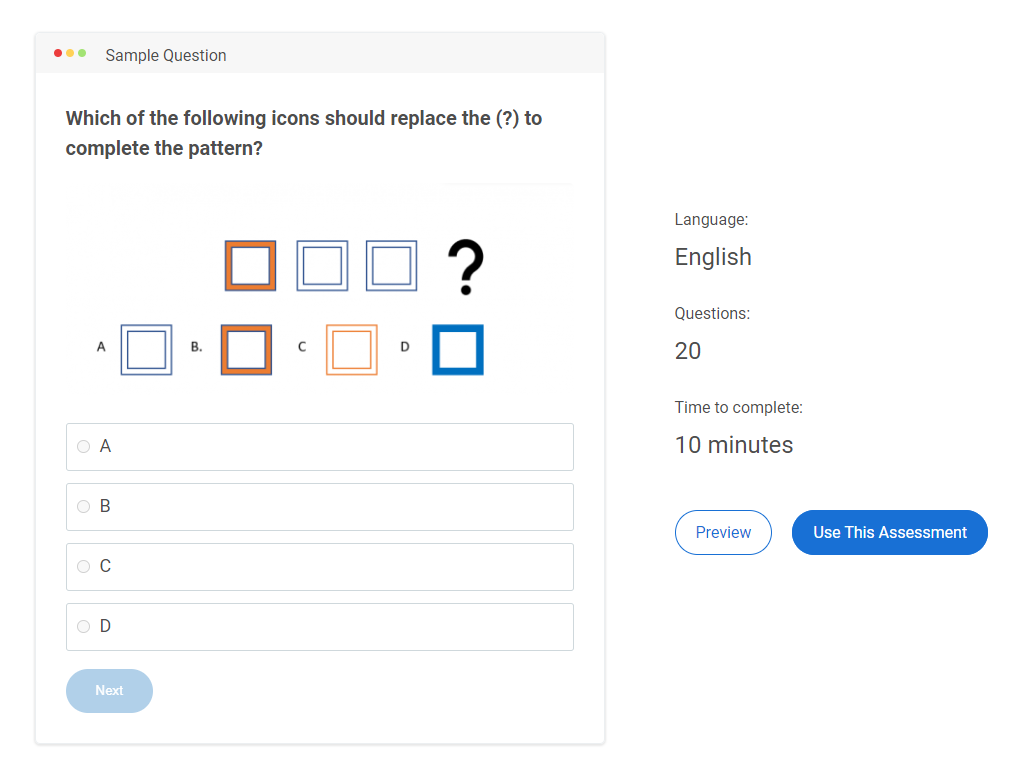
A cognitive assessment test for employment measures important mental skills like memory, problem-solving, attention, and reasoning. It’s a useful tool for businesses looking to understand a candidate’s cognitive strengths and weaknesses, especially for roles that require sharp thinking or decision-making.
These psychometric tests are also valuable in remote hiring, helping companies assess candidates objectively, no matter where they’re located. Plus, they can help identify any cognitive challenges, which might be useful when considering role fit or making workplace accommodations.
What Do Cognitive Ability Tests Measure?
Cognitive ability assessment tests measure a range of mental capabilities critical to job performance. These include problem-solving, logical reasoning, memory, attention span, and learning agility. For instance, verbal reasoning tests assess how well someone processes and interprets language, while numerical reasoning evaluates the ability to work with data and numbers effectively.
Why Are Cognitive Assessment Tests Important?
Cognitive assessments can immensely improve your hiring and recruiting process, enabling you to hire top talent.
By using cognitive assessments for hiring, employers can make more informed decisions about which candidates are most likely to succeed.
For example, a job that requires problem-solving skills, such as an engineer or a software developer, would benefit from candidates who score high on cognitive assessments that measure logical reasoning and critical thinking.
Similarly, a job that requires attention to detail, such as a financial analyst or medical professional, would benefit from candidates who score high on assessments that measure visual and auditory processing abilities.
Here are a few benefits of employing cognitive ability tests for hiring.
- Accurate and Reliable
Cognitive assessment tests for adults are reliable and precise measurements of cognitive abilities. They achieve this through standardized procedures, validation processes, and normative data.
These tests are deemed reliable because they offer consistent and accurate results even if candidates take them again after some time.
- Easy to Administer Online
Unlike traditional assessments, online cognitive assessments don’t require a lot of resources and time. You can leverage powerful online assessment software like ProProfs Quiz Maker and choose the assessment template that best suits your needs.
Watch: How to Create an Online Quiz
- Gives You a Competitive Advantage
Cognitive assessment tests should be a key part of your talent management strategy since your team’s collective learning potential can give you an edge over your competitors regarding performance.
With highly predictive cognitive testing tools, you can quickly identify candidates with the best potential for success, increasing the chances of your business growth and minimizing the risk of poor hiring.
These tools can help you find talent that’s adaptable, quick to learn, and skilled at problem-solving- setting you up for success in the long run. But there’s a catch: you need to use cognitive assessments strategically to build a strong benchmark for the future.
Types of Cognitive Ability Assessments
There are several types of cognitive ability tests you can leverage. They are:
1. Verbal Reasoning
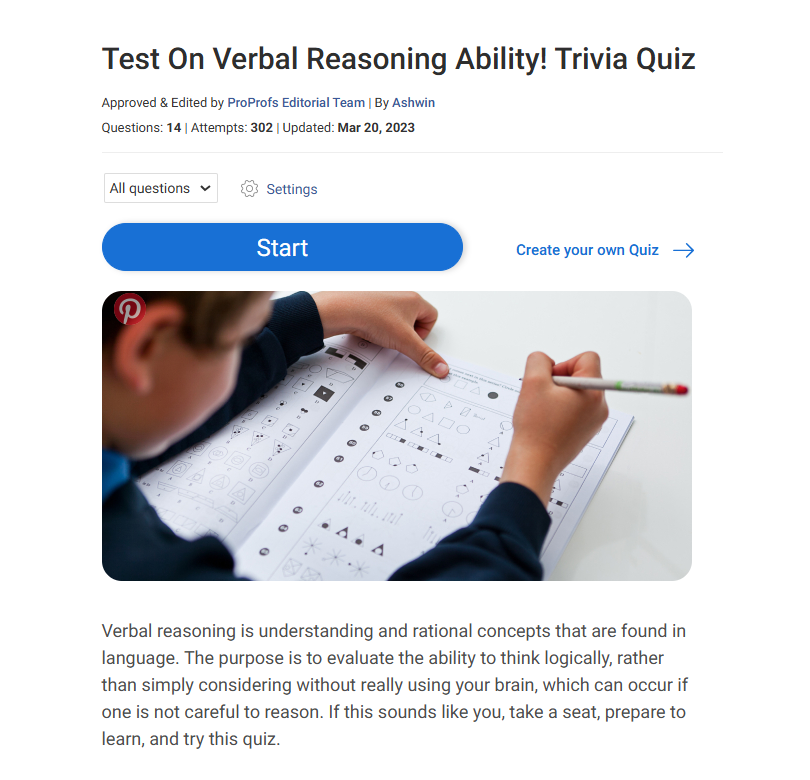
As the name suggests, verbal reasoning cognitive tests evaluate an individual’s proficiency in understanding and interpreting written information.
In a verbal reasoning cognitive assessment test, candidates are given a passage of text and then answer questions based on that passage, which can be in true or false, multiple-choice, or other formats.
Businesses across industries leverage this cognitive assessment to assess candidates’ ability to grasp and communicate intricate and crucial details effectively.
It helps them predict the effectiveness of candidates in working as a team player and communicating with others.
For instance, a financial services firm might use a verbal reasoning test to evaluate a candidate’s capacity to grasp complex financial reports and communicate the findings to clients.
2. Numerical Reasoning
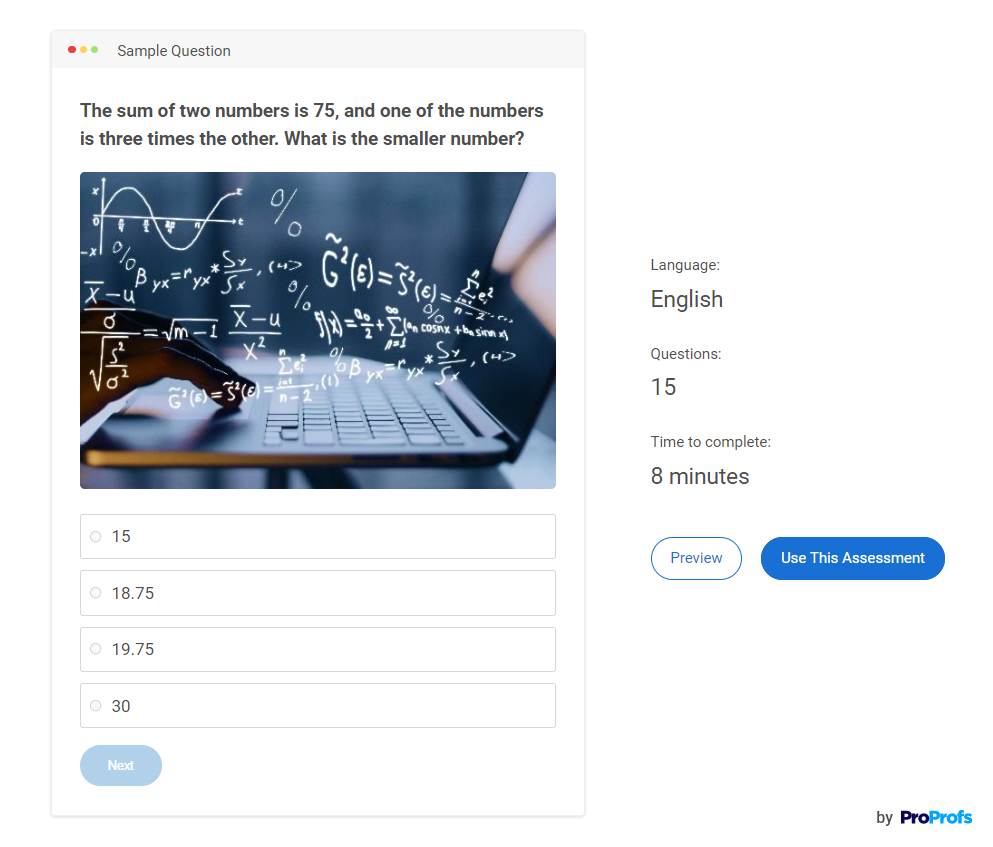
A numerical reasoning test assesses an individual’s ability to work with numbers and interpret data presented in tables, ratios, number sequences, charts, and percentages.
This cognitive ability assessment helps businesses predict a candidate’s potential to perform well in jobs that require numerical competence, such as accountancy.
Here’s a cognitive ability test example: In a data analyst position, individuals must make sense of technical data and formulate strategies accordingly.
3. Spatial Reasoning Test
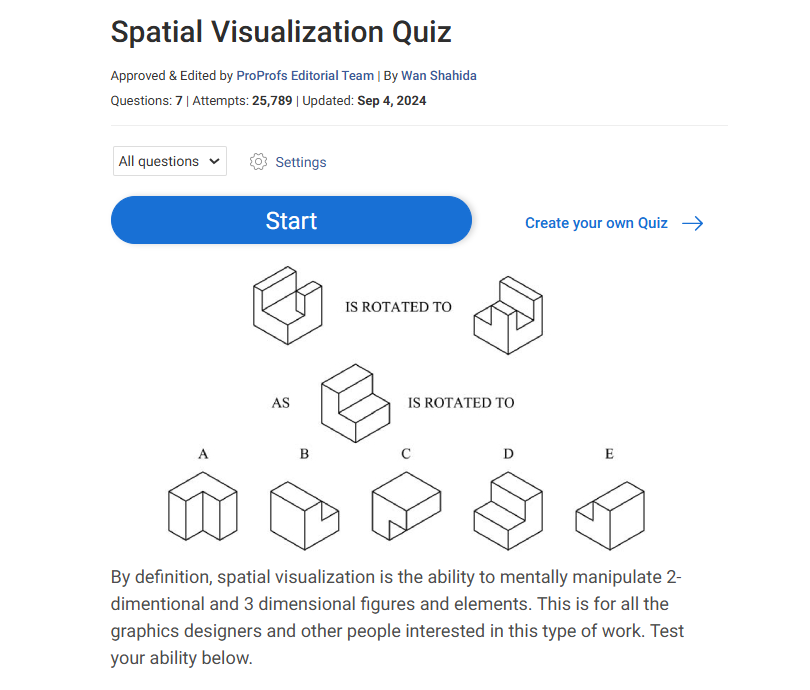
Spatial ability assessments measure a person’s visual and spatial perception and ability to mentally manipulate objects in 3D space.
So, what benefits do they bring to businesses during the hiring process?
Well, imagine a company that manufactures complex machinery. In this scenario, spatial ability is a key skill for understanding how the different parts fit together and function as a whole.
Using spatial ability tests during the hiring process, the company can identify candidates who possess this skill and are likely to excel in the role. Spatial ability tests can also be useful in architecture, engineering, and design, where spatial reasoning is critical for success.
4. Logical Reasoning
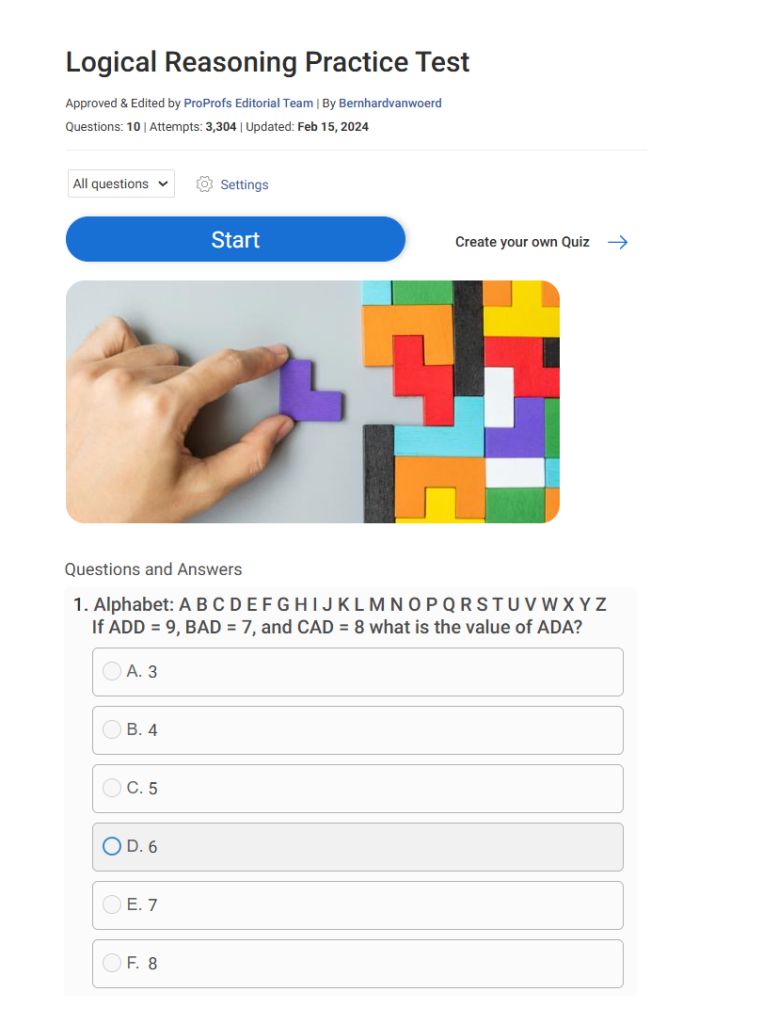
Logical reasoning tests are a great tool employers use to assess candidates’ ability to comprehend and handle complex and abstract ideas.
They measure a person’s ability to analyze information and draw reasonable conclusions. For instance, a question might present a scenario and then ask you to identify the most appropriate solution or conclusion.
Logical reasoning tests are useful during the hiring process because they give insight into a candidate’s potential to make sound decisions on the job.
5. Learning Agility Test
Learning agility is the ability and willingness to learn from experiences, adapt to new situations, have a growth mindset, and perform efficiently in new work conditions.
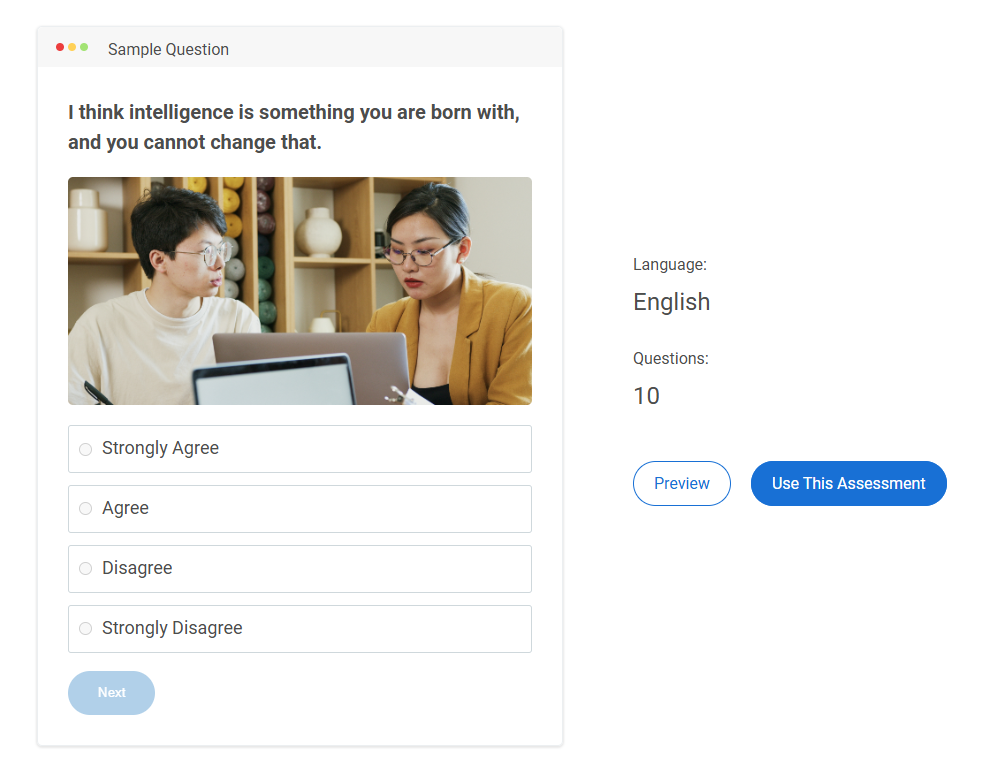
Individuals with high learning agility are likely to be successful in leadership positions as they respond well to unfamiliar situations and learn experientially. In fact, the Korn Ferry Institute found that managers with the highest learning agility scores are twice as likely to be promoted over a 10-year period.
6. Attention to Detail
Attention to detail tests assess a candidate’s ability to complete tasks on time while giving attention to detail and ensuring quality. This cognitive assessment test helps organizations identify candidates who can provide high-quality and detail-oriented results.
It is particularly useful for screening and recruiting entry-level administrative and clerical positions. The test measures candidates on speed-based comparison questions using numbers, text, images, and visuals.
For example, let’s say a company is looking to hire a data entry clerk and wants to ensure that the person they hire can capture every detail accurately and on time.
They use an attention-to-detail test to assess candidates’ ability to identify errors in a data set and their capacity to quickly manage large amounts of information.
7. Language Test
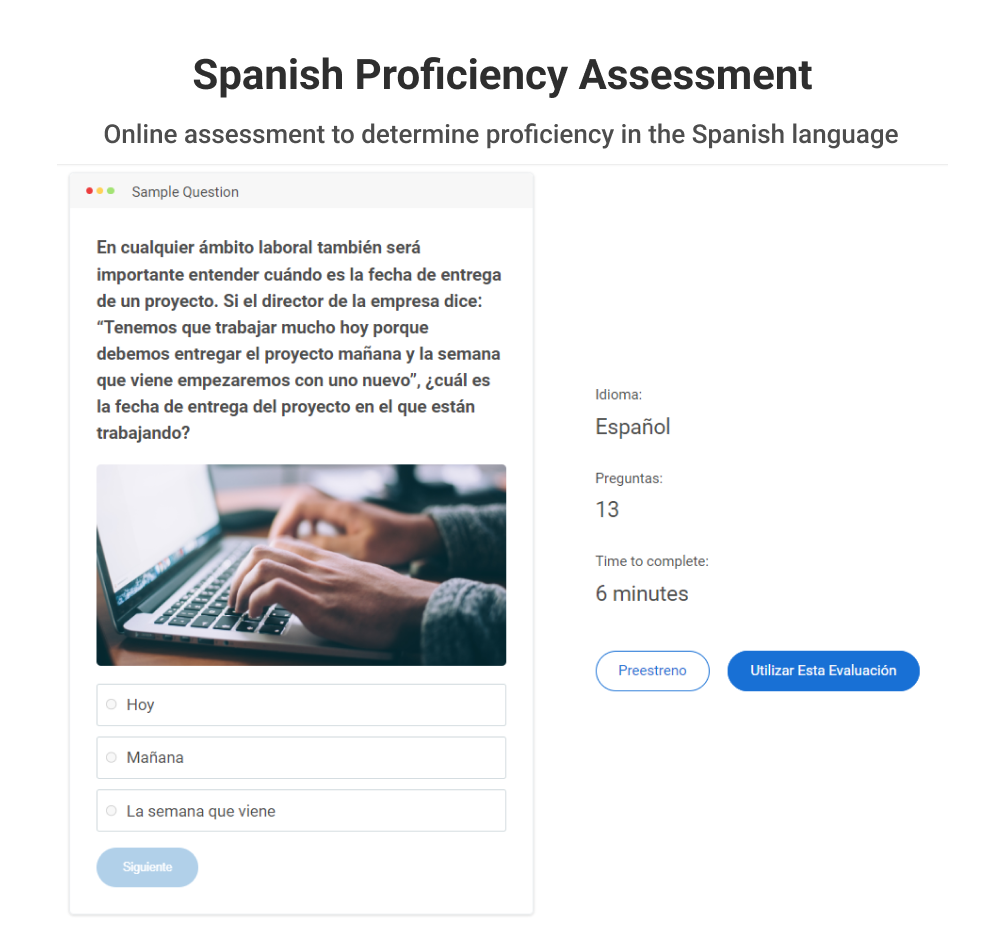
Effective communication is one of the essential skills a company expects in its employees. Fluency in both oral and written communication is considered a professional standard and a strength.
That’s why employers use language cognitive tests and communication assessments to evaluate candidates’ understanding of grammar, spelling, and other language-related concepts such as parts of speech, common words and abbreviations, and punctuation.
Generally, these tests are designed to measure a candidate’s English language skills for various professional roles such as sales, customer support, marketing, etc.
Watch: How to Create a Vocabulary Quiz
FREE. All Features. FOREVER!
Try our Forever FREE account with all premium features!
Cognitive Ability Test Scores: What They Mean for Your Hiring Process
So, here’s the deal with cognitive assessment test scores—they’re not just random numbers. They’re actually super helpful for figuring out which candidates are worth your time. Employers usually use two main ways to look at these scores, and they each tell a different story.
- Relative Scoring: This is like ranking people in a talent show. Candidates’ scores are compared to each other, and only the top ones make it to the next round. For example, if the employer is looking at the top 10%, you better hope your score shines bright. It’s a smart way to narrow things down when there are a ton of applicants.
- Absolute Scoring: Here, there’s no competition with others—it’s all about hitting a specific benchmark. Think of it like passing a driving test. Maybe you need to score 30 or more to qualify. Simple and straightforward.
Both methods make the hiring process less of a guessing game. You get real, actionable data to spot candidates who fit the role, making life way easier for recruiters and hiring managers.
How to Create a Cognitive Assessment Test
To understand how to create a cognitive assessment test, let’s look at the process using ProProfs Quiz Maker as an example. Here’s a step-by-step guide:
1. Define Assessment Objectives
Identify the specific cognitive skills you want to evaluate, such as problem-solving, logical reasoning, or memory. Clear objectives will guide the structure and content of your assessment.
2. Choose a Template or Build from Scratch
Decide whether to use a pre-designed template or create a custom assessment. Templates can save time while building from scratch allows for more tailored content.
3. Add Diverse Questions
Incorporate various question types—multiple-choice, true/false, fill-in-the-blank—to comprehensively assess different cognitive abilities.
4. Configure Test Settings
Set parameters like time limits, question order (randomized or fixed), and scoring criteria to standardize the assessment process.
5. Implement Anti-Cheating Measures
To maintain test integrity, enable features such as:
- Question and Answer Shuffling: Randomizes the order to minimize cheating.
- Time Limits: Restricts the duration to complete the quiz.
- Question Pooling: Draws random questions from a larger set for each attempt.
- Tab Switching Prevention: Warns or penalizes users for navigating away during the quiz.
- Proctoring: Monitors quiz takers via webcam or screen sharing.
These measures help ensure a fair testing environment.
6. Customize Branding
Add your organization’s logo, colors, and themes to align the quiz with your brand identity.
7. Preview and Test
Review the quiz to ensure all elements function correctly and make necessary adjustments before deployment.
8. Distribute the Quiz
Share the quiz with participants via secure links, email invitations, or by embedding it on your website.
9. Analyze Results
Utilize reporting tools to evaluate participant performance and gain insights into their cognitive abilities.
Best Practices for Cognitive Ability Assessments
Now that you know a thing or two about cognitive assessments, let’s discuss the best practices you can leverage to optimize your hiring effort.
- Consistently Track the Adverse Impact
Adverse impact refers to the biased outcome of a prejudiced selection process on a particular protected group (intentional or otherwise).
Such instances arise when the selection procedure for hiring or promotion discriminates against a protected class, i.e., a race, gender, age (over 40), religion, disability status, etc.
So, it’s best to keep track of this phenomenon to ensure that you hire the best talent through an unbiased assessment process.
- Lay All Your Cards on the Table
Some candidates may feel confused and uneasy when presented with assessment tests. You can make the experience less intense for the candidates by explaining the purpose of the tests, how you’ll approach the results, and how they’ll impact their chances of selection.
- Use the Score as Guidance
Instead of entirely depending on the cognitive quiz test scores, you can treat them as a guide to help you navigate the sea of candidates and shortlist the ones who resonate with your brand, its culture, and its needs.
- Make Your Assessments Engaging
To encourage candidate engagement with your assessments, make them more interactive by:
- Using a variety of question types: Instead of relying solely on one format, mix it up with multiple choice, matching, and short answer questions.
- Incorporating visuals: Use images and diagrams to make the assessment more visually appealing.
- Regularly Review & Update Your Assessments
Periodically assess the relevance and effectiveness of your cognitive assessments to align with changing job requirements.
- Use a Reliable Assessment Tool
Choose a validated tool with anti-cheating features and clear reporting to ensure accurate results and informed decisions.
What Are the Features of the Best Cognitive Assessment Tools?
When evaluating cognitive assessment tools, it’s essential to consider features that ensure reliability, ease of use, and effective results. The best tools offer a combination of the following:
- User-Friendly Design
The tool should be intuitive and easy to navigate for both administrators and candidates, minimizing the need for training or extensive setup.
- Customizability
A top-tier tool allows flexibility in tailoring assessments to specific job roles, skills, or levels of complexity, making the tool adaptable for different recruitment needs.
- Scalability
Whether you’re testing a handful of candidates or an entire workforce, the tool should seamlessly scale without compromising on performance or accuracy.
- Diverse Question Formats
The best tools include a variety of question types—such as multiple-choice, true/false, or short answer—to assess cognitive abilities comprehensively.
- Accessibility & Inclusion
The tool should be available in multiple formats (e.g., online, mobile) and languages to ensure accessibility for all candidates, regardless of background or location.
- Security & Data Privacy
Given the sensitive nature of assessment data, top tools prioritize robust security features to protect both candidates’ information and the integrity of the test.
- Anti-Cheating Features
To ensure the authenticity of results, the best tools include built-in anti-cheating mechanisms like time limits, randomized question orders, proctoring, and tab switching prevention. These features help maintain the integrity of the assessment process.
- Automated Scoring & Reporting
Top cognitive assessment tools offer automated scoring that ensures accurate, consistent results and generates clear, actionable reports. This streamlines the decision-making process and reduces human error, providing employers with reliable insights quickly.
Watch: How to Automate Scoring for Assessments
FREE. All Features. FOREVER!
Try our Forever FREE account with all premium features!
Limitations and Criticisms of Cognitive Assessment Testing
Cognitive assessment tests are a useful tool in hiring, but they have some limitations to be aware of:
- Narrow Focus: These tests measure specific abilities like logical reasoning and memory but don’t capture other essential traits, such as creativity or interpersonal skills. For example, a test may not reflect how well a candidate handles team dynamics or adapts to new ideas.
- Cultural and Socioeconomic Bias: Cognitive assessments may favor individuals from certain educational or cultural backgrounds, leading to skewed results. For instance, a person who grew up in a different culture might not understand some context in a test, even though they have the skills for the job.
- Impact of Stress and Anxiety: Some candidates may struggle with test anxiety, which can affect their performance. A candidate who is excellent under normal conditions might not do well on a timed test simply due to stress, which can create an inaccurate reflection of their abilities.
- Overlooks Soft Skills: These tests focus on cognitive abilities but don’t assess emotional intelligence, leadership, or communication skills—key qualities for many roles. For example, a person might score well on a cognitive test but lack the empathy or collaboration skills needed for a management position.
- Need for Complementary Tools: Cognitive assessments should be used alongside other tools, like interviews or personality tests, to get a fuller picture of a candidate’s abilities. Relying on a cognitive test alone might overlook a candidate’s potential in real-world scenarios.
Make Smarter Hiring Decisions With Cognitive Assessments
Cognitive assessment tests are an effective way to help businesses identify top talent and improve the recruitment process. By incorporating these tests, you can reduce the chances of making a bad hire and build a more capable, diverse team. These tools offer valuable insights that can help make your hiring process more objective, reducing unconscious biases and leading to more informed decisions.
However, to fully benefit from cognitive assessments, it’s essential to use the right tools and strategies. ProProfs Quiz Maker is an excellent option, allowing you to create customized assessments that are easy to administer, with automated scoring and detailed reports. With a user-friendly interface, it lets you evaluate candidates more effectively, saving time and resources while ensuring the selection of the best fit for your organization.
Frequently Asked Questions
Cognitive screening tests for candidates and employees measure abilities like problem-solving, critical thinking, and decision-making. They help employers gauge a person’s learning potential, adaptability to new situations, and capacity for complex tasks, providing insights into their suitability for specific roles.
Poor scores may indicate difficulty with job duties requiring high cognitive ability, such as data analysis and problem-solving. Good scores suggest a candidate possesses strong analytical and critical thinking skills, potentially excelling in roles demanding these abilities. However, consider scores alongside experience and personality.
No. IQ tests measure general intelligence, providing a single score. Cognitive ability tests used for employment focus on specific cognitive skills relevant to job performance, like verbal and numerical reasoning, offering more targeted insights into strengths and weaknesses for workplace success. Here are some cognitive assessment test examples.

 We'd love your feedback!
We'd love your feedback! Thanks for your feedback!
Thanks for your feedback!



